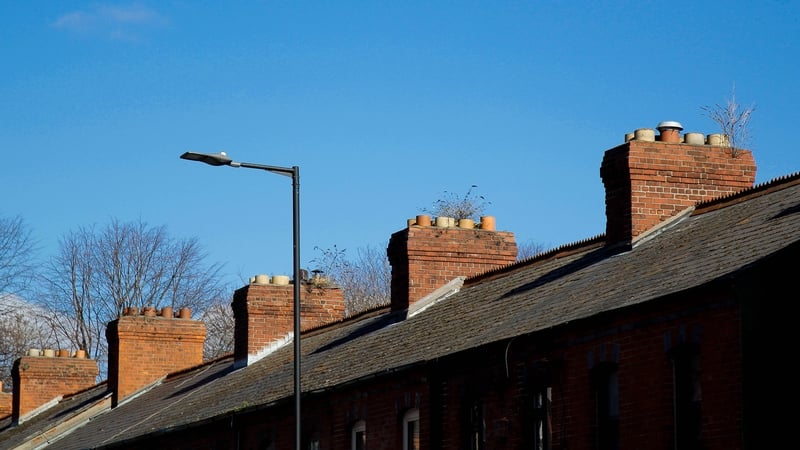The Residential Tenancies Board has warned of “concerning trends” of rental inflation in Galway that need further investigation.
The RTB said that after eight consecutive quarters of high growth in new tenancy rent levels in Galway, it will engage directly with renters, landlords and other rental sector stakeholders in the county this June to investigate the trend further.
The board said it will also host a forum to address rental law compliance.
According to the latest RTB/ESRI Rent Index, the average rent for new tenancies in Galway city was €1,730 in the fourth quarter of last year.
‘We can’t stay at weekends’
Callum Phelan and Jake O’Brien are students living in an six-room apartment in Galway city. Their landlord lets out the accommodation to tourists at the weekends, meaning those living there during the week can only stay there from Monday to Friday.
“It can fit nine in the house. There’s a bunk bed, there’s a room with two beds, and then there’s single rooms. It’s €800 a month, so it would be about €4,000 a month, Monday to Friday. We can’t stay weekends,” said Mr Phelan.
“You have to pay extra (if you want to stay at weekends) … it’s not good. It’s been like that the whole time, since first year. This is my third year now, and it has always been fairly steep. I know lads paying €250 a week. It’s expensive.
“In the rooms, there’s just a bed. There are no wardrobes or anything, so I just have everything out of my suitcase,” he added.

“I share a room with someone, so I’m paying €600 a month. Having to leave at the weekends is a joke,” said Mr O’Brien.
“I don’t think there’s enough accommodation for students that cheap enough anyway, with the cost-of-living prices going up … But even if we’re not there, we have to pay. I had two weeks off for Easter, and we still had to pay €150 for the week, even if we’re not using the accommodation,” he added.
Another student, Nicole Bukovska, is currently searching for accommodation with four others.
“We were looking at prices that were maybe, €1,000 a month or something like that, and that’s just for one person. So, it’s all over the place,” she said.
“It’s an awful lot, because we are all students as well. It’s quite hard. We’re in student accommodation at the moment, and we pay €747 a month for a small, little room. Next year, that same accommodation is going to go up to around €900 a month, so it’s really hard.”
‘Impossible’ to find anywhere below €800
Lorcan Boulcer believes he is lucky to be paying reasonably affordable rent in Galway city.
“It seems to be the last place in Galway that rent is affordable,” he said, speaking of his own case.
“I know the climate, I hear it from my friends every day. There’s a couple of us looking for a house for one of our new colleagues. It’s impossible to get anywhere below €800 or €900 a month, it’s ridiculous.”
“How much is €800 or €900 a month out of an average wage? It’s an arm and a leg. Really, you’re in vast amounts of shared accommodation where you could be sharing with up to six people … What are we supposed to do? There’s no discretionary income anymore. Every single cent that you make seems to go to somebody, before you even get to decide what to spend it on yourself,” he added.
“Rents in Galway seem to be matching the rents in Dublin, and rents in Dublin are more expensive than rents in London, which is ridiculous. That wasn’t the case a couple of years ago. When my sister went to college here, rents were between €300 and €400 a month. Now, it’s €600, €650 for a shared room,” said another resident, Dagda Semler.
“It’s not just rents within the city, it’s rents in smaller places outside of the city as well. They just keep rising continuously.”
More regulation needed on short-term lets
Housing activist Fionnuala Doyle Wade says the blame lies at the feet of the Government.
“The main problem that I would see as an activist and someone that’s involved in housing activism is that locals are being pushed out due to short-term lets. There’s a huge amount of tourism coming into the city. That’s important, we need tourism, but they should not be taking up entire homes,” she said.
“There’s such a short stock, and we’re prioritising people coming in for a short time period. We have people coming in who are here for maybe a week or two, living in whole houses, and locals not able to find accommodation with really expensive rents, living in hostels because they can’t find anywhere to live. It’s a huge problem with students, also with refugees and asylum seekers.
“The Government hasn’t done their job or due diligence in terms of building enough housing, but also in terms of regulating short-term lets and looking at vacant properties. We have thousands and thousands of vacant properties in this country that are sitting empty. People need to be put into them,” added Ms Doyle Wade.
We need your consent to load this rte-player contentWe use rte-player to manage extra content that can set cookies on your device and collect data about your activity. Please review their details and accept them to load the content.Manage Preferences
New tenancy rent highest in Dublin
On a county basis, rent for new tenancies was highest in Dublin at €2,117 per month and lowest in Donegal at €987 per month.
The figures show that the average rent for new tenancies nationally rose by 5.5% year-on-year to €1,680 in the fourth quarter of last year.
It rose by 4.6% year-on-year for existing tenancies nationally to €1,440.
The RTB said this marks a moderation on the rates of rental inflation seen earlier in 2024.
In the first quarter of 2025, registered private tenancies rose by 4.6% annually to 240,604 but fell by 360 tenancies or 0.15% from the fourth quarter of 2024.
Landlords associated with registered private tenancies increased by 1.4% annually to 104,470 in the first quarter of this year but fell by 1,124 landlords or 1% from the fourth quarter of 2024.
Approved Housing Body registered tenancies grew by 11% annually to 51,230.
The RTB received 4,693 Notices of Termination in the first three months of 2025. This is a decrease of 2.4% from the same period last year.
The RTB today published 36 sanctions against landlords with a total value of €102,490 for serious breaches of rental law.
The board has announced a new four-year partnership with Fexco to run the RTB’s outsourced customer service centre from July 2025.
The RTB has also announced that it will release a pilot of its new online Dispute Resolution Centre for final testing by stakeholders in May.
“Our update today highlights our ongoing commitment to driving compliance with rental law,” said RTB Director Rosemary Steen.
“The new Rent Index data has flagged unusual patterns of rental inflation in Galway that we are engaging directly with stakeholders in the county to address,” Ms Steen said.
Research Officer with the ESRI Dr Rachel Slaymaker said the latest data shows a clear moderation in the rate of rental price inflation throughout 2024.
“Despite falling rental inflation for new tenancies nationally though, price rises do remain persistently high in certain counties,” Dr Slaymaker said.
The Institute of Professional Auctioneers & Valuers (IPAV) said the data highlights the exodus of private landlords from the market.
“Today’s figures show that landlords with just one property form the largest cohort of the rental market at 25.09% and the figure has dropped 0.4% in Q1 2025 from the previous quarter,” said Pat Davitt, Chief Executive, IPAV.
“The drop in private landlords is attributable to high taxes that do not apply to institutional landlords, up to 52% of rental income, and onerous regulation,” Mr Davitt said.




